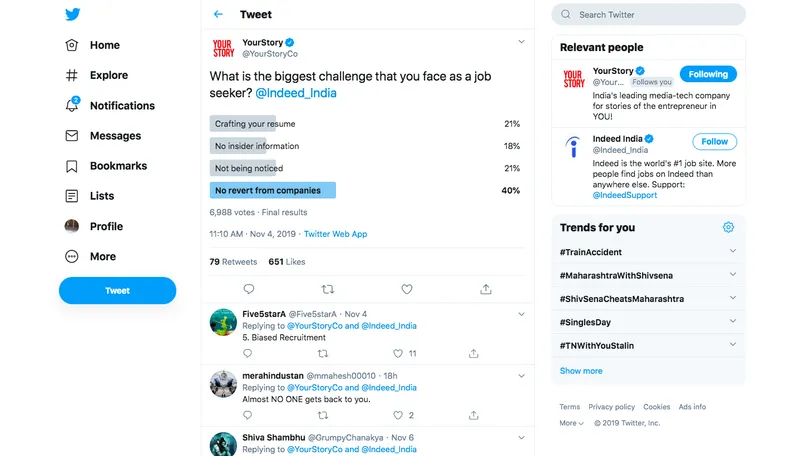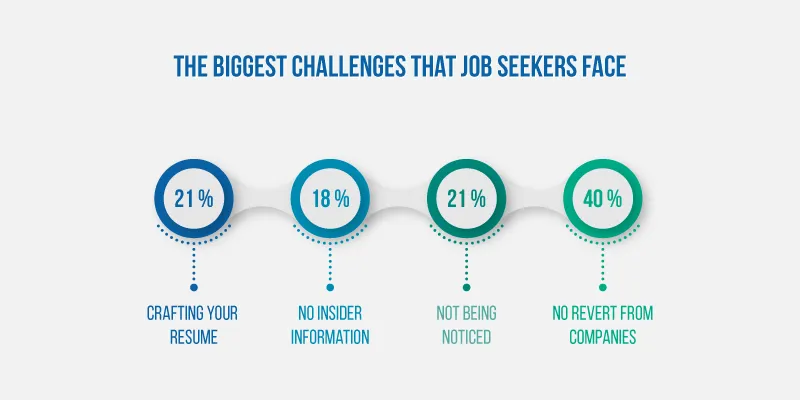
indeed
View Brand PublisherWhat are the biggest challenges job seekers face today? Hear what 6900 professionals share with YourStory and Indeed
Be it the absence of a response from the employer, or tips for crafting a good resume, or the lack of information about a company and its work culture, Indeed India decodes the top challenges that job seekers face and why.
Everybody has a dream job; a career that they aspire to achieve. Job seekers work hard to gain the right skills and knowledge to give them an edge over others in the role they seek. However, at times, despite their best efforts, one may find it difficult to move a step closer to this sought after job.
We recently conducted an online poll with Indeed India to take a deep dive into the challenges faced by job seekers. Here are the key takeaways:
- 40 percent of the respondents (3500+) shared that silence from the recruiter during or after the recruitment process is one of their biggest challenges
- Crafting a resume and getting noticed were the next big challenges, both taking 21 percent of the votes
- 18 percent of the respondents shared that getting insights on the employer was challenging

Why recruiters don’t call back
Not getting a call back from the employer or a trail going cold usually means one thing - a rejection. Considering that recruiters today handle hundreds of applications, it is possible for some to slip through the cracks. However, with over 40 percent of respondents stating that a lack of response from the employer is their biggest challenge, it looks like it’s not just a victim of chance. That said, not hearing back about a job you applied for could be more than a standard rejection.

One of the key reasons why recruiters don’t get back is that a number of tech tools and platforms screen resumes based on certain keywords used in the job description; so, in the absence of these keywords, it is likely that no one has ever seen your application. At the same time, a challenge also arises because job seekers often send a standard resume for all job openings. Customising resumes to highlight the candidate’s work experience with respect to the industry and the requirements of the position will help to get through the tech tools and also to get the recruiters’ attention.
Other reasons could be a change of hiring priorities, recruiters waiting to hear back from candidates who have been selected or simply that the position was filled. While these may be legitimate reasons, it is safe to say that silence on the part of the company is in no way acceptable.
"Ghosting candidates, or even thinking about it, could be bad for one's employer brand. When people have a great experience, they want to share it. They talk about it with their friends; they jump online and rave about it. But remember, when people have a bad experience, they talk about that too. It is therefore important that candidates, irrespective of landing a job, have a good experience with your company. In order to help both the candidate and the company, recruiters should focus on getting personal and staying transparent with candidates. It’s better to hear “no” than to hear nothing at all. Allowing candidates to track their application progress will increase transparency. This personal touch should be a part of the wider effort to create a positive candidate experience,” says Mr. Sashi Kumar, Managing Director, Indeed India.
Two other big challenges - crafting a good resume and getting noticed
“There are thousands of articles and self-help books on how to craft a perfect resume, but as evident from the poll, this continues to be a challenge. Apart from principles like keeping the text error-free, not overusing buzzwords, highlighting successes, etc. that remain constant, there are new rules to the game, “ says Kumar.
“A common mistake job seekers make is using a standard resume while applying for job openings. Instead, they must tailor their resume to demonstrate how they are the right fit for the role.”
Insider information - how well do you know your potential employer
Job seekers want to know about the company as much as the job role, especially what past and present employees have to say. Getting this information might be challenging, especially when you do not know anyone who has worked or works there. Not surprisingly, 18 percent of the respondents agreed that getting insider information is challenging. While job sites and employment-oriented platforms today do provide some insights on the company and its work culture, Indeed provides deeper visibility through its Company Pages.
Along with standard information from the employers, it also includes ratings and inside information shared by current and past employees about the company’s culture, management, pay, benefits, work-life balance, job security and advancement opportunities. This helps prospective employees evaluate the employee experience and authenticity of the brand.
Takeaways for employers: What do these challenges reveal
Now, while some of these challenges look like a job seeker’s pain point at the outset, they are in fact challenges for recruiters as well. For instance, the radio silence from the employer not only hurts the applicant but also the company.
“Today, every touchpoint within and outside the organisation impacts the brand. Given that the recruitment process makes a statement about how the organisation treats people, a positive ‘candidate experience’ goes a long way in showcasing how the brand treats its people. Not only is informing the candidates that they didn’t make it through, the right thing to do, it is always better to inform them even when recruiters hit a snag,” says Kumar.
Marching ahead in the talent game
As the culture and expectations in the talent market continue to evolve, companies and job seekers must embrace the new rules of the game - the changing cultural dynamics, and new technologies to stay relevant in a changing world. While job searches do come with a fair share of challenges, there are none that can’t be overcome. All you need to do is strategize and implement those practices that are best suited for the context.







